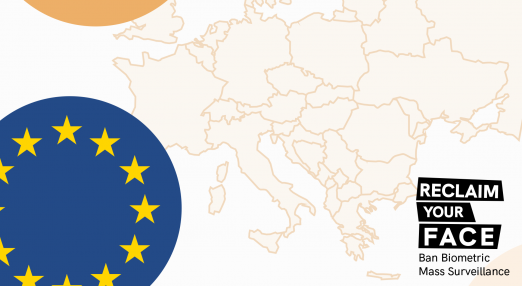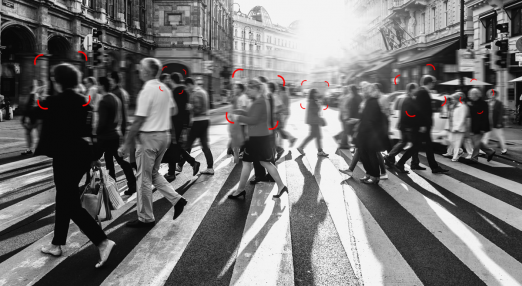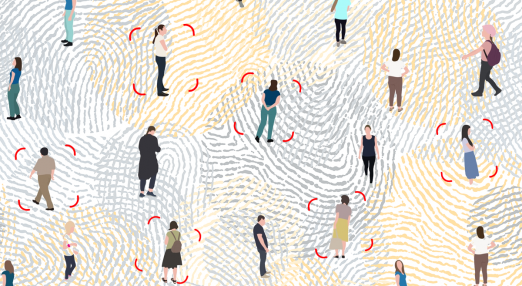Biometrics
Biometrics refers to the use of analytical tools and devices which capture, record and/or process people’s physical or behavioural data. This can include faces (commonly known as facial recognition), fingerprints, DNA, irises, walking style (gait), voice as well as other characteristics. Under the EU’s data protection laws, this biometric data is especially sensitive. It is linked to our individual identities, and can also reveal protected and intimate information about who we are, where we go, our health status and more. When used to indiscriminately target people in public spaces, to predict behaviours and emotions, or in situations of imbalances of power, biometric surveillance such as facial recognition has been shown to violate a wide range of fundamental rights.
Filter resources
-

2022: Important consultations for your Digital Rights!
Public consultations are an opportunity to influence future legislation at an early stage, in the European Union and beyond. They are your opportunity to help shaping a brighter future for digital rights, such as your right to a private life, data protection, or your freedom of opinion and expression.
Read more
-

European court supports transparency in risky EU border tech experiments
The Court of Justice of the European Union has ruled that the European Commission must reveal initially-withheld documents relating to the controversial iBorderCtrl project, which experimented with risky biometric ‘lie detection’ systems at EU borders. However, the judgement continued to safeguard some of the commercial interests of iBorderCtrl, despite it being an EU-funded migration technology with implications for the protection of people’s rights.
Read more
-

Reclaim Your Face impact in 2021
A sturdy coalition, research reports, investigations, coordination actions and gathering amazing political support at national and EU level. This was 2021 for the Reclaim Your Face coalition – a year that, despite happening in a pandemic – showed what the power of a united front looks like.
Read more
-

Italy introduces a moratorium on video surveillance systems that use facial recognition
On 1 December 2021, the Italian Parliament introduced a moratorium on video surveillance systems that use facial recognition technologies. This law introduces, for the first time in an EU Member State, a temporary ban for private entities to use these systems in public places or places accessible to the public. This moratorium is an important achievement: it recognises the dangers posed by technologies such as facial recognition to people's rights and freedoms. The moratorium will be in force until 31 December 2023 at the latest, unless a new law is introduced on the subject of biometric surveillance before that date.
Read more
-

Press release: European Commission jumps the gun with proposal to add facial recognition to EU-wide police database
The European Commission has put forward a proposal to ‘streamline’ the automated sharing of facial recognition images and other sensitive data by police across the EU. What will be discarded in order to ‘streamline’ the process? Vital safeguards which are designed to protect all of us from state over-reach and authoritarian mass surveillance practices.
Read more
-

The ICO provisionally issues £17 million fine against facial recognition company Clearview AI
Following EDRi member Privacy International's (PI) submissions before the UK Information Commissioner's Office (ICO), as well as other European regulators, the ICO has announced its provisional intent to fine Clearview AI.
Read more
-

New German government calls for European ban on biometric mass surveillance
The newly-agreed German government coalition has called for a Europe-wide ban on public facial recognition and other biometric surveillance. This echoes the core demands of the Reclaim Your Face campaign which EDRi has co-led since 2020, through which over 65 civil society groups ask the EU and their national governments to outlaw biometric data mass surveillance.
Read more
-

Civil society calls on the EU to put fundamental rights first in the AI Act
Today, 30 November 2021, European Digital Rights (EDRi) and 119 civil society organisations launched a collective statement to call for an Artificial Intelligence Act (AIA) which foregrounds fundamental rights.
Read more
-

New RESOURCE PAGE helps supporters BAN biometric mass surveillance
The Reclaim Your Face collective has put together a brand new Resource Page, helping all activists spread the word and take action easily, online, offline – at all times, wherever they are.
Read more
-

Do no harm? How the case of Afghanistan sheds light on the dark practice of biometric intervention
In August 2021, as US military forces exited Afghanistan, the Taliban seized facial recognition systems, highlighting just how a failure to protect people’s privacy can tangibly threaten their physical safety and human rights. Far from being good tools which fell into the wrong hands, the very existence of these systems is part of broader structures of data extraction and exploitation spanning continents and centuries, with a history wrapped up in imperialism, colonialism and control.
Read more
-

AI Regulation: The EU should not give in to the surveillance industry
Although it claims to protect our liberties, the recent European Commission’s legislative proposal on artificial intelligence (AI) promotes the accelerated development of all aspects of AI, in particular for security purposes.
Read more
-

Big brother at the Prague airport. The state refuses to explain how the biometric camera system works
When Václav Mach, collaborator of the Czech digital-legal organization, an EDRi member, Iuridicum Remedium (IuRe) and law student at the University of Olomouc, asked the state for more detailed information on the use of smart biometric cameras at Prague's Václav Havel Airport, he obtained just general phrases. "They kept secret what they could. Their non-transparency doesn’t add to their credibility,“ he says in an interview with HlídacíPes.org. The article below is a summary of the more extensive interview, translated from Czech into English by EDRi member IuRe.
Read more
